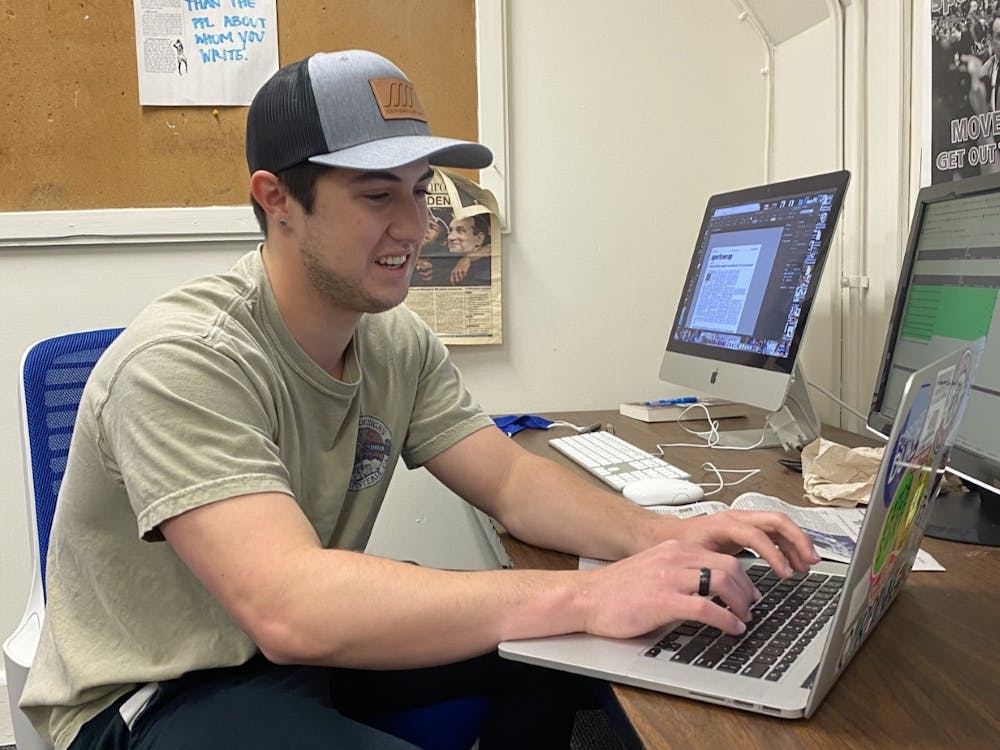Looking for an opportunity to get to know professors outside of breakout rooms?
VLearn provides students the “opportunity to connect outside the classroom with faculty, regardless of physical location.” It is analogous to FLUNCH, a program where students can invite a faculty member to lunch on campus free of cost, though FLUNCH is currently suspended due to the pandemic.
Any undergraduate student can invite a professor to VLearn, and the faculty member must accept the request. Students and faculty who participate in a VLearn session are eligible for a “one-time unique commemorative gift” from Duke Stores if the student hosts submit a screenshot of the event.
However, VLearn has not been a perfect substitute for FLUNCH, noted Mar Gutiérrez, lecturing fellow of romance studies. She said that her experience with VLearn was “very awkward” since she “did not know at all the student [she] met.”
Normally, FLUNCH sessions are times for building connections, Gutiérrez said, adding that her VLearn experience “felt like it was a tutoring session.”
First-year Emily Prudot Gonzalez used VLearn to explore summer research opportunities. She held a VLearn session with her chemistry professor in the fall, and while she appreciated the informality of VLearn, she didn’t feel completely satisfied with the conversation.
“I felt engaged because it wasn’t as formal as it could’ve been which made it more comfortable,” she said. “I also feel, though, that even though this made me more comfortable, she wasn’t really in the best setting to answer the questions I had. Some of my questions went unanswered or weren’t answered in the way I hoped.”
Sarah Jean Barton, assistant professor of orthopedic surgery, felt that the ability to have a conversation in a familiar environment minimized distractions and helped her “[feel] very engaged.”
“I was in my home environment, the student was in their home environment, and we were able to just really focus on the conversation at hand versus being somewhere on campus with people coming up to us or those more external distractions,” Barton said. “So I think that helps engagement.”
Students and faculty appreciated the opportunity to get to know each other outside of the classroom. First-year Athena Yao chose to host a VLearn session because she “wanted to learn more about his work.”
“I came out of it feeling really inspired,” Yao said, “because there was so much that I didn't think about before in terms of interdisciplinary intersection for neuroscience.”
Similarly, Barton was also grateful for the opportunity to connect with someone with mutual interest that she “otherwise would have had no way of connecting with,” adding that she is currently only teaching online graduate courses.
While targeted as an opportunity for undergraduates to develop meaningful connections with faculty members, Barton found that her VLearn conversation allowed her to reconnect with former colleagues.
“It really has ended up being kind of a benefit for me to connect with other researchers and faculty who are not usually my closest working groups right now,” Barton said. “And then also hopefully, facilitating our research experience for the student this summer that wouldn't have otherwise been possible.”
Barton cited VLearn’s accessibility as a potential consideration for the future of the program, noting that she’ll be curious to see whether they keep one or both of the programs.
“I think VLearn might actually be more accessible to some students who are traveling or not living on campus or for whatever reason, and this could be a student or a faculty member just have more flexibility or more comfort connecting virtually,” she said.
Get The Chronicle straight to your inbox
Signup for our weekly newsletter. Cancel at any time.

Kathryn Thomas is a Trinity junior and news editor of The Chronicle's 118th volume.

